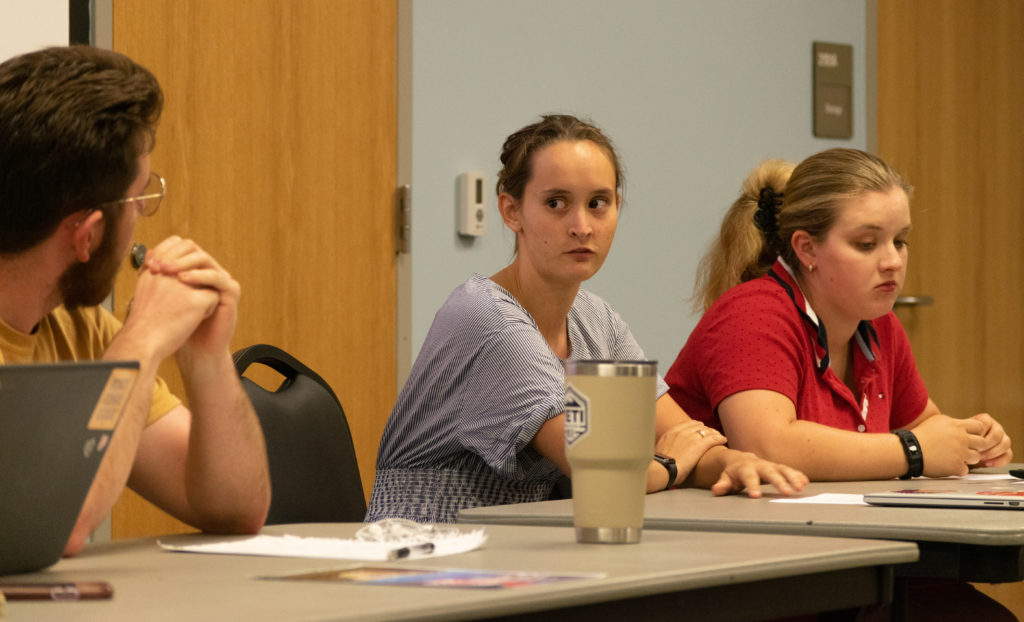
Jonah Hinebaugh | The Crow’s Nest
By Carrie Pinkard
On the right side of the panel, a “Make America Great Again” hat and a “I work like crazy to support the lazy” laptop sticker. On the left, gold College Democrat shirts adorned with donkeys.
The Student Life Center’s 2101 multipurpose room turned red and blue on Sept. 30 for a debate on health care.
USF St. Petersburg’s College Democrats faced Turning Point USA, a conservative grassroots organization with chapters on more than 1,500 campuses.
Kacy Cartmell, Lexi Bishop and Andrew Vandenburg represented Turning Point USA, while Trevor Martindale, Karla Correa and Haley Ostwalt spoke for the USFSP College Democrats.
The debate was moderated by Naya Payne, president of USF St. Petersburg’s Community and Civility student organization.
In their opening statements, it was clear that the groups disagreed over whether health care should be publicly funded.
“We think that health care is a fundamental human right,” said Correa, vice president of USF St. Petersburg College Democrats. “As the richest country in the world, the United States has a responsibility to provide its residents adequate and affordable health care.”
“We believe in open-market health care where people have many options. I see health care as something that’s more of a commodity,” said Cartmell, president of Turning Point USA.
The College Democrats said Bernie Sanders has outlined their ideal health care system with his “Medicare for All” bill. They pointed out that nearly every other developed country in the world has a socialized health care system, but Vandenburg, Turning Point USA’s secretary, said that kind of system wouldn’t work in the United States.
“We have a very different kind of country and a different culture where a single-payer system would not work,” Vandenburg said. “Those countries pay much higher taxes in order to have these social safety nets.
“If we were to put these systems in place over a four-year presidential term, we would see a drastic change in the way people go about doing their business in this country. They would not be willing to pay those kinds of taxes.”
Martindale, president of USF St. Petersburg College Democrats, said that under the current system, 28 percent of people living in the United States don’t have health care. The College Democrats said they want everyone insured under a single-payer system, while Turning Point USA’s president Cartmell said the people should be able to decide for themselves.
“Millions of those people don’t want health care, and that’s their choice. The government shouldn’t be involved. If they don’t want health care, it’s not the government’s business,” she said.
When debating the merits of a single-payer system, the issue of wait times for patients arose. Bishop said it’s nearly impossible to have socialized health care and also have wait times as short as those in the United States.
Correa said solutions to wait times could be importing more doctors from other countries and subsidizing the cost of medical school.
While the College Democrats suggested bringing people into the country, Turning Point USA’s Vandenburg advocated for sending people out.
“The solution to wait times is to reduce the number of people who need the care within the country. Right now, we have millions of illegal immigrants,” Vandenburg said. “They have access to all the same medical services.
“If they simply were not here, Americans would have much better access.”
Another point of contention was whether or not the government should fund sex reassignment surgeries for transgender individuals.
“It’s not medically necessary. If you can give me a reason of somebody who has to undergo a sex change surgery that is medically necessary, then sure,” Bishop said.
“Gender dysphoria is real. It is a big part of people’s mental health, and that’s the reason it should be provided,” Correa replied.
But the groups found middle ground on the issues of mental health and marijuana.
Both sides supported increasing access to mental health services and felt strongly that cannabis should be legal.
“I think all drugs should be legal. I don’t care what it is, I think it should be legal. Whether or not you ban marijuana, people are still going to use it,” Cartmell said. “Throwing people away in these for-profit prisons is doing nothing, other than ruining communities.”
Those who missed the debate don’t need to be too disappointed, Martindale said, as he wants to make political debates a regular part of campus culture at USF St. Petersburg.
“We want this to become a major event and attract more people,” he said. “Maybe held in the ballrooms or Harbor Walk, where it could be catered and would be a mightier event.”



